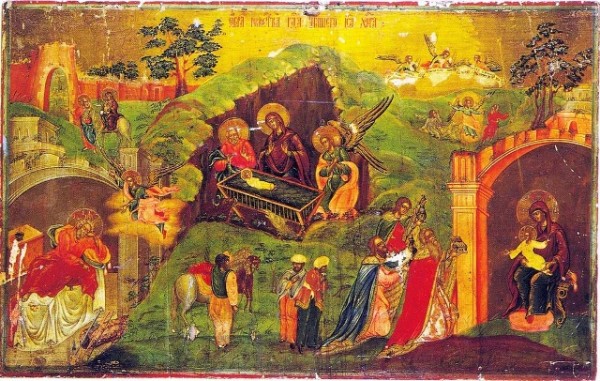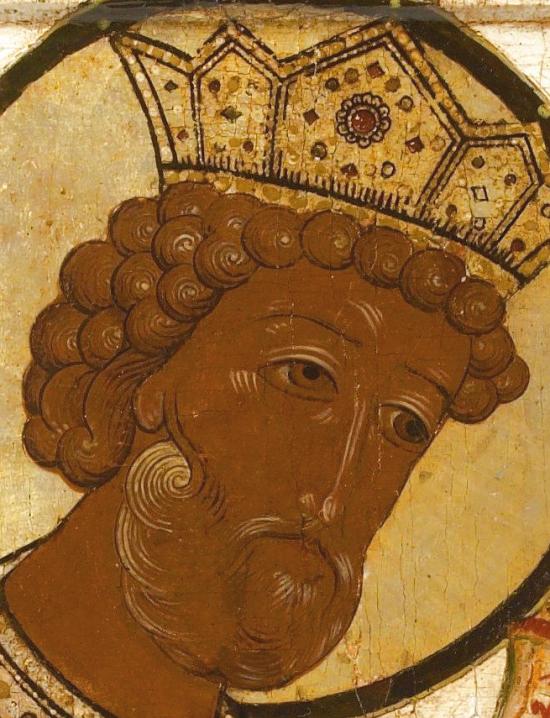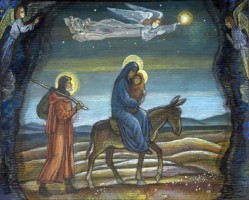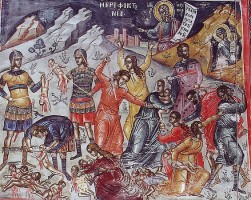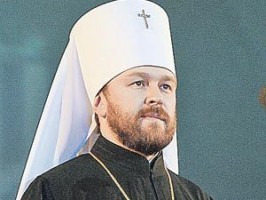In the Name of the Father, and of the Son, and of the Holy Spirit!
The Hieromartyr Hilarion, the patron saint of our monastery, wrote: “The Nativity of Christ is not the remembrance of the earthly birth of a great teacher in the idyllic setting of a Nativity scene. No, this was the great triumph of the performance of great piety, that is, of a religious mystery: God was manifest in the flesh (1 Timothy 3:16).”
The events of the Nativity of Christ were neither accidental nor historically unprecedented. They were the fulfillment of promises pronounced by God already in Paradise to our forefathers: that the Seed of the Woman – that is, the Son of the Mother of God – would strike (crush, wipe) the head of the serpent. The waiting for fulfillment of this promise was long and agonizing. Many holy men of God and prophets predicted in the Holy Spirit what this great event would be and what the awaited Messiah would be like, thereby strengthening and comforting the people in this expectation.
Among these Prophets, which the Church calls greater and lesser, was the Psalmist David, whom we now celebrate; he was a direct ancestor of the Queen of Heaven. “We all praise the Father of God, David the King, from whom came the staff of the Virgin. From her shone froth Christ” – thus do the church hymns magnify the saint we are celebrating.
David’s life was full of both heroic deeds and concerns for the political system, which was then still a semi-nomadic Jewish people; his life has both grievous falls into sin, and also examples of such repentance that still remain of the highest example and lesson for us.
Saint David was, from his youth, meek and God-loving. Already in his youth, in moments of leisure, he played on the psaltery, raising up doxology to God from the abundance of his heart. From this great love of God, the Lord chose him to be King and anointed him through the Prophet Samuel both for the Kingdom and for prophetic ministry.
This elicited jealousy in King Saul, from whom the Spirit of God was absent, and tormented him with envy and sadness.
David had to suffer much from this evil but lawful King. But not wanting to take revenge on his oppressor, he did not dare raise his weapon against him. In his sorrows he cried out: Deliver me from them that work iniquity, and from men of blood do Thou save me (Psalm 58:2). Hope in God, for I will give thanks unto Him: He is the salvation of my countenance, and my God (Psalm 41:12). Many are the tribulations of the righteous, and the Lord shall deliver them out of them all (Psalm 33: 20).
During the battle with the Philistines, David, with God’s help, defeated the enemy warrior Goliath.
David abandoned military equipment and went to single combat with a sling: a weapon primitive even in those times. To Goliath’s ridicule, the young man replied: Thou comest to me with a sword, and with a spear, and with a shield: but I come to thee in the name of the Lord of hosts, the God of the armies of Israel, whom thou hast defied (1 Kings [1 Samuel] 17:45).
Following the death of Saul and his heirs, Saint David was proclaimed King over all the twelve tribes of Israel.
But he was not exalted in the days of his prosperity, to do judgment and justice unto his people. And then trouble occurred: carried away by the beauty of Bathsheba, the King ordered that her husband Uriah be sent to the most dangerous part in the battle. Uriah perished, and King David married Bathsheba. To denounce the King’s criminal act, God sent the Prophet Nathan. With deep sorrow the ruler cried out in repentance: Have mercy on me, O God, according to Thy great mercy (Psalm 50 [51]:1). The Lord forgave the Prophet. But in atonement for his guilt, troubles did not leave him. David’s Son Absalom rebelled against his father, and he had to leave Jerusalem and go into hiding.
For the blood that he spilled, the Lord did not give the saint an opportunity to erect a temple to the Most High God, but gave this to his son, Solomon.
Hover, the Holy King accepted all sorrows and trials as befits us Christians today, without humility as retribution for his sins.
The Prophet David reposed a thousand years before Christ’s Nativity and was buried in Jerusalem.
With the grace of the Holy Spirit, the Prophet David compiled the Psalter, that great book about which we hear more than all the other books of the Old Testament; a book in which is expressed all the experiences of the believing soul: its grief over the loss of God and prayer for the Most High’s mercy and intercession; immense jubilation over union with God and the burning of divine jealousy. How many beautiful spiritual lines are in it that we all remember: Have mercy on me, O God, according to Thy great mercy… (Psalm 50 [51]); or He that dwelleth in the help of the Most High (Psalm 90 [91]); and Give ear, O God, unto my prayer, and distain not my supplication (Psalm 54 [55]:1); and many, many others – more than can be listed.
But the most important treasure of this book are the great prophesies about the Messiah, which were spoken by the Holy Spirit through the pious King.
David, through the Holy Spirit, foretold the fact of the coming into the world of Christ the Savior (Psalm 88 [89]:20) and His Divine and human nature, not as King of the Jews, but as Redeemer of all mankind.
The Prophet foretold the adoration of the magi and the future priestly ministry of the Messiah: His preaching among the nations and their turn to the truth.
He also prophesied the triumphant entry into Jerusalem (Psalm 8:3; 117 [118] 25-26) and the betrayal of one of His closest friends and disciples (Psalm 40 [41]:10; 54 [55]:14); and soon the bitter death of the betrayer himself (Psalm 54 [55]16, 24; 108 [109]:18).
The Holy Prophet foretold the sufferings of Christ with such force and detail that it was as if he were an eyewitness: The kings of the earth were aroused, and the rulers were assembled together, against the Lord, and against His Christ (Psalm 2:1), for They have spoken against me with a deceitful tongue, and with words of hatred have they encompassed me (Psalm 108:2).
He describes the false accusation of the Righteous One (Psalm 26:12; 34:11; 108: 2; 2:3 and His silence when on judgment (Psalm 27:14); mockery of Him (Psalm 21:7,8,16; 108:25); bullying, beatings, spitting, scourging (Psalm 34:15, 21). He foretold His shameful death: crucifixion (Psalm 21:15-18), and eating vinegar and bile instead of drinking (Psalm 68:22).
He foresaw by the Holy Spirit the Savior’s prayer for His enemies (Psalm 108:4) and the exclamation on the Cross: Into Thy hands I will commit My spirit (Psalm 30:6).
The prophetic words of Psalm 67 sound forth as a triumphant hymn of resurrection on the Paschal night: Let God arise and let His enemies be scattered.
The Prophet foresaw the Son of God’s Ascension and His sitting on the right hand of God the Father (Psalm 15:11; 23:7; 67:19; 109:1; 117:19) and the Second Glorious Coming (Psalm 49:3-6).
And the eternal Kingdom over the world: Thy throne, O God, is for ever and ever; a sceptre of uprightness is the sceptre of Thy kingdom (Psalm 44:6-7)!
You see what kind of prophecies there are in this book!
If St. David was a great prophet, then an example of how one should attend to and fulfill prophecy can be seen in the lives of today’s saints: the Righteous Joseph the Betrothed and James, the Brother of the Lord.
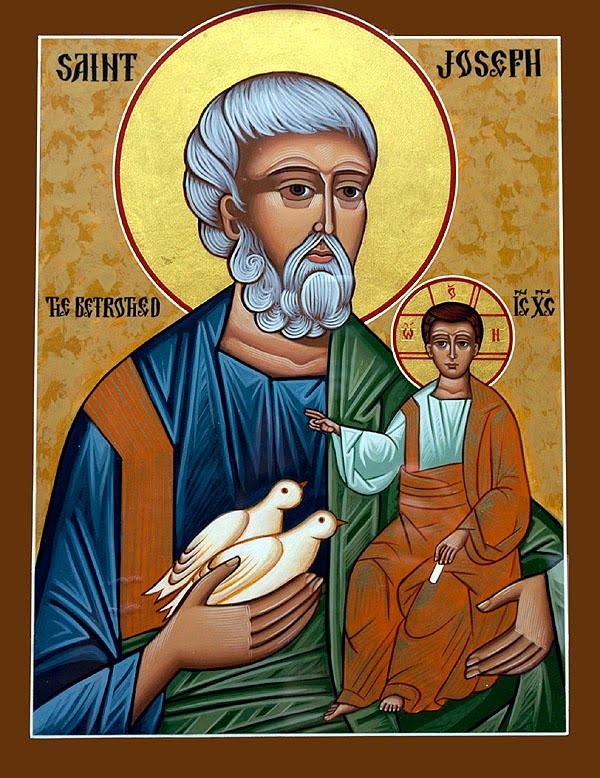 The widowed, revered octogenarian, the Elder Joseph – who had six children from his first marriage – was chosen by the chief priests as the guardian of the virginity of the Most Holy Theotokos, who had given a vow of celibacy from the day of her Entrance into the Temple. According to his holy purity, he was not able to allow any impure thoughts about the Virgin Mary, for which reason he was able to accept with undistorted mind the Angel’s news about the great mystery of the Incarnation. He stood at the infant’s cradle during the worship of Him by the shepherds and the Magi, and dedicated all the rest of his life to the ministry of the Theotokos and Her Divine Infant. During the flight to Egypt from the wrath of King Herod he was their guardian in life, and later earned their subsistence by laboring as a carpenter. Saint Joseph died at the age of nearly one hundred.
The widowed, revered octogenarian, the Elder Joseph – who had six children from his first marriage – was chosen by the chief priests as the guardian of the virginity of the Most Holy Theotokos, who had given a vow of celibacy from the day of her Entrance into the Temple. According to his holy purity, he was not able to allow any impure thoughts about the Virgin Mary, for which reason he was able to accept with undistorted mind the Angel’s news about the great mystery of the Incarnation. He stood at the infant’s cradle during the worship of Him by the shepherds and the Magi, and dedicated all the rest of his life to the ministry of the Theotokos and Her Divine Infant. During the flight to Egypt from the wrath of King Herod he was their guardian in life, and later earned their subsistence by laboring as a carpenter. Saint Joseph died at the age of nearly one hundred.
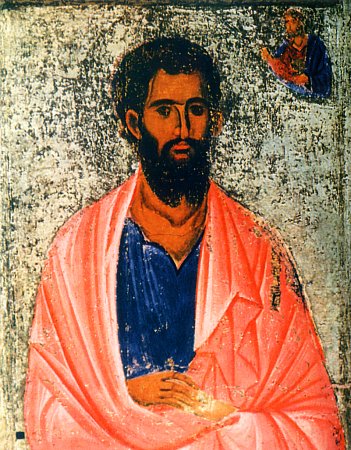 The Holy Apostle James, the Brother of the Lord, was the elder son of Joseph the Betrothed from his first marriage. He did not doubt; he did not speak as certain people did about Christ: “Is this not the Son of Joseph? Did I not accompany this helpless Infant in Egypt? Is He not simply human?” But, accepting Christ as Savior, he followed Him as a disciple, by his apostolic labors affirming the teaching of the Kingdom of God.
The Holy Apostle James, the Brother of the Lord, was the elder son of Joseph the Betrothed from his first marriage. He did not doubt; he did not speak as certain people did about Christ: “Is this not the Son of Joseph? Did I not accompany this helpless Infant in Egypt? Is He not simply human?” But, accepting Christ as Savior, he followed Him as a disciple, by his apostolic labors affirming the teaching of the Kingdom of God.
After the Lord’s Ascension, he was the first bishop of Jerusalem, enjoying great respect among the simple inhabitants of the Holy City. He received a martyric death for Christ: he was thrown by orders of the chief priests from the roof of the temple in Jerusalem for publically proclaiming to the people the fulfillment of the prophecies of the coming of the Messiah: the God-Man, the Lord Jesus Christ. Thus did the Jewish priests kill Christ’s Apostle, deny the fulfillment of the prophecies, and reject their own salvation.
Their example admonishes us that it is not only important to receive the prophecies and to know them as did the wise men of Jerusalem gathered by Herod for advice. It is also important to fulfill them in one’s life.
In these days, again reliving the joy of the fulfillment of the good news, we believe that all the prophecies have been fulfilled. Everything that humanity needed to know for salvation, for the forgiveness of sins, and the acquisition of eternal life, has been revealed to us in the Gospel – that exposition of God’s Word. There are no greater spiritual mysteries either in heaven or on earth.
But now, having such witnesses for the truth, there are some who in their proud self-confidence and excessive vanity believe that the Lord will continue to provide ever newer prophecies that will supplement the New Testament or even present in themselves a Newer Testament. These people, having placed themselves among the ranks of prophets, or even of new Christs, create their own doctrines and sects, proclaiming themselves to be newly-revealed saviors of mankind.
But they have a single goal: they want to turn their naïve followers from servants of God into servants of man, eager to worship them personally as creation, rather than God as Creator. And poor people are eager to try to see in this murky mirror a reflection of their future fate, to see their wellbeing, and to know what will become of the world, what the exchange rate will be, and what football teams will win. And the false teachers and charlatans lead astray their followers from the path of Evangelical truth. The Holy Prophets, who for our salvation revealed the Truth, Christ Himself, are betrayed and rejected; God is forgotten and ridiculous superstitions are avidly followed by people who consider themselves not only prudent adults, but who even call themselves Christians.
But, in the words of the great Prophet Daniel, The mystery which the king asks the explanation of it is not in the power of the wise men, magicians, enchanters, or soothsayers to declare to the king (Daniel 2:27). In today’s reading from the Epistle to the Galatians, the Apostle Paul proclaims: But I certify you, brethren, that the Gospel which was preached of me is not after man. For I neither received it of man, neither was I taught it, but by the revelation of Jesus Christ (Galatians 1:11-12).
The Prophets cannot be assigned and recorded. The Prophets relied at all times on their ministry to the Holy Spirit.
“A false prophet is not a prophet; he is not sent by God,” wrote the Hieromartyr Hilarion. We can safely continue the thought of our patron saint by saying that false prophets are messengers of darkness and its ministers.
Let us remember this firmly and say to those that ask us about prophecy in the contemporary world: “The Lord God does not change; and His Word is perfect and permanent.”
This word is written in the Old and New Testaments, which witness to Christ and to salvation in Him through His sacrificial death for mankind. Our main prophecy is: God became man, that man might become god.
The time of prophecy has come to pass; the time is here to implement these promises.
And the memory of today’s three saints, saints of the Old and New Testament, witness to this.
It remains for us, who undertake the festal worship of the Divine Infant, only to repeat with gratitude the words of the Apostle John the Theologian: Lord, to whom shall we go? Thou hast the words of eternal life (John 6:68).
“Today Christ is born of the Virgin in Bethlehem. Today He Who is without beginning begins to be, and the Word is made flesh. The Powers of heaven rejoice, and earth with mankind is glad. The Magi offer gifts; the Shepherds proclaim the marvel, while we cry aloud without ceasing: Glory to God in the highest and peace on earth; good will among men.”
Amen.
Translated from the Russian.












